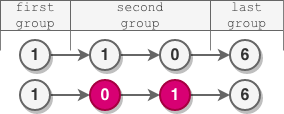Description
You are given the head of a linked list.
The nodes in the linked list are sequentially assigned to non-empty groups whose lengths form the sequence of the natural numbers (1, 2, 3, 4, ...). The length of a group is the number of nodes assigned to it. In other words,
- The
1stnode is assigned to the first group. - The
2ndand the3rdnodes are assigned to the second group. - The
4th,5th, and6thnodes are assigned to the third group, and so on.
Note that the length of the last group may be less than or equal to 1 + the length of the second to last group.
Reverse the nodes in each group with an even length, and return the head of the modified linked list.
Example 1:

Input: head = [5,2,6,3,9,1,7,3,8,4] Output: [5,6,2,3,9,1,4,8,3,7] Explanation:
- The length of the first group is 1, which is odd, hence no reversal occurs.
- The length of the second group is 2, which is even, hence the nodes are reversed.
- The length of the third group is 3, which is odd, hence no reversal occurs.
- The length of the last group is 4, which is even, hence the nodes are reversed.
Example 2:

Input: head = [1,1,0,6] Output: [1,0,1,6] Explanation:
- The length of the first group is 1. No reversal occurs.
- The length of the second group is 2. The nodes are reversed.
- The length of the last group is 1. No reversal occurs.
Example 3:

Input: head = [1,1,0,6,5] Output: [1,0,1,5,6] Explanation:
- The length of the first group is 1. No reversal occurs.
- The length of the second group is 2. The nodes are reversed.
- The length of the last group is 2. The nodes are reversed.
Constraints:
- The number of nodes in the list is in the range
[1, 105]. 0 <= Node.val <= 105
Code
Time Complexity: , Space Complexity:
/**
* Definition for singly-linked list.
* struct ListNode {
* int val;
* ListNode *next;
* ListNode() : val(0), next(nullptr) {}
* ListNode(int x) : val(x), next(nullptr) {}
* ListNode(int x, ListNode *next) : val(x), next(next) {}
* };
*/
class Solution {
public:
ListNode* reverseEvenLengthGroups(ListNode* head) {
// Creating a dummy node to avoid adding checks for the first node
ListNode* dummy = new ListNode();
dummy->next = head;
ListNode* prev = dummy;
for(int len = 1; len < 1e5 && head; len++) {
ListNode* end = head;
ListNode* nextHead;
int j = 1;
while(j < len && end && end->next) {
end = end->next;
j++;
}
nextHead = end->next;
if((j % 2) == 0) {
end->next = NULL;
prev->next = reverse(head);
head->next = nextHead;
prev = head;
head = nextHead;
} else {
prev = end;
head = nextHead;
}
}
return dummy->next;
}
ListNode* reverse(ListNode* head) {
if(!head) return head;
ListNode* prev = NULL;
while(head) {
auto tmp = head->next;
head->next = prev;
prev = head;
head = tmp;
}
return prev;
}
};